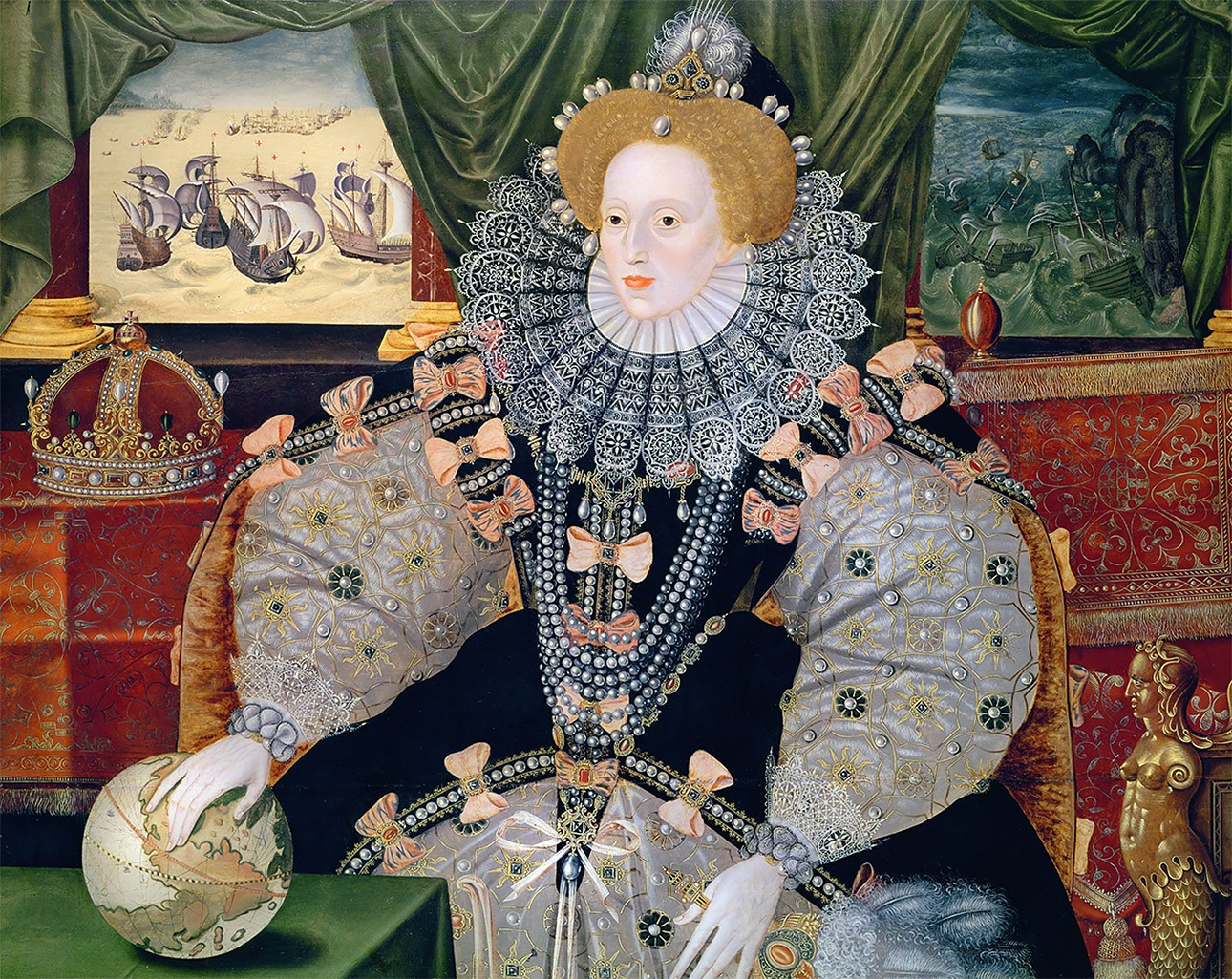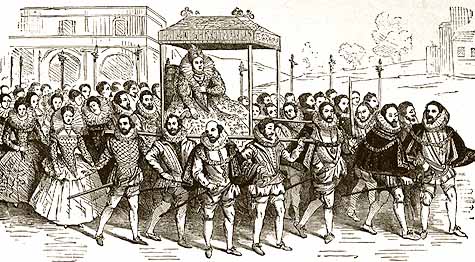
Above: the famous Armada portrait (1588).
"I know I have the body of a weak and feeble woman, but I have the heart and stomach of a king, and of a King of England too". - Queen Elizabeth I, Tutbury on the eve of the Armada, 1588.
Yesterday was the 480th anniversary of the birth of Queen Elizabeth I, only daughter of Henry VIII by his second consort Anne Boleyn. The Elizabethan era was prosperous, exciting, and one never seen before or since. Many historians and commentators in the last four hundred years or so have suggested that Elizabeth was England's greatest monarch. I decided to write this blog post having come across an interesting debate amongst historians Alison Weir, Sarah Gristwood and Martyn Downer about who England's greatest monarch truly was, with the debate favouring either Elizabeth, her father Henry VIII or Victoria.
Elizabeth was well aware that she needed to be a pragmatic yet sensible monarch in context of the fairly disastrous reigns of her predecessors and siblings Edward VI and Mary I. She revered her father's memory and demonstrably sought to emulate him in his magnificence and splendour, while desiring to be, like him, immensely popular with the English people. As a Venetian ambassador wrote in 1558, 'she prides herself on her father and glories in him'. Yet, for the first twenty or so years of her reign, until the growing threat of Spain escalated and Catholic plots surrounding Mary Queen of Scots intensified, Elizabeth was fairly liberal in her religious policies, unlike either her father or sister. While desiring that her subjects outwardly conform to the terms of the Elizabethan religious settlement, ostentatiously Protestant but considerably less rigorous than the Protestant policies of her brother Edward VI, Elizabeth famously quoted her desire not 'to make windows into men's souls' concerning religion.
What could distinguish Elizabeth as England's greatest monarch is first and foremost the political and religious world in which she lived, and her decisions made in context of prevailing European behaviours and events. The late sixteenth century and early seventeenth century witnessed increasing religious violence and hostility in context of the European Reformation and Counter-Reformation. France engaged in acts of religious terror, famously comprising the St Bartholomew's Day Massacre of 1572 in which thousands of Protestant Huguenots were slaughtered, while Spain ruthlessly punished heretics and dissidents. The outbreak of the witchcraft persecutions escalated in this era, particularly intense in Germany, leading to the brutal deaths of thousands of innocent subjects, motivated largely by political tensions and religious conflicts. England itself had been influenced by the increasing religious bloodshed affecting all of Europe during this period, when Mary I chose to burn over 200 Protestant heretics at the stake in her five year reign. Monarchs were severely threatened in this era - several French kings died young, one of whom - Henry III - was assassinated; and the Scottish queen Mary was deposed by her subjects on account of her unacceptable Catholic religion and political decisions.

Above: St Bartholomew's Day Massacre, 1572.
Yet Elizabeth did not impose religious bloodshed on her people. As has been already suggested, she allowed people to hold their own religious beliefs and follow their own practices in the privacy of their households, as long as they outwardly conformed to the Protestant settlement enacted by the state. Unlike the Spanish king or in France, she did not punish heresy ruthlessly, and did not enact a reign of terror in her country, unlike her elder sister. She was pragmatic, relatively liberal, and desiring of peace. It was only considerably later, in the 1580s and thereafter, that she began to more ruthlessly punish Catholicism, not because it was associated with heresy but because of its political threat - it was classed as treason. This was only done in context of plots surrounding Mary Queen of Scots, and assassination attempts by hostile Catholics. This seems to mark out Elizabeth as a contender for England's greatest monarch, in view of her religious tolerance and in view of the fact that, unlike either Henry VIII or Victoria, she faced a far greater threat from Europe.
Returning to the foreign policy dimensions of Elizabeth's reign, she could be viewed as England's greatest monarch on account of the fact that, as a woman (when many such as John Knox argued venomously that women had no right whatsoever to rule over men) she was already constrained by her gender, and yet was able to preserve peace and stability in her realm when faced with the hostility of both France and Spain. Most famously, she managed to defeat the Spanish Armada in 1588, and her countless marriage negotiations with men of both these powers - most significantly, the Duke of Anjou in the 1570s and the Archduke Charles of Austria - meant that she was able to remain on good relations with these countries by virtue of the fact that she offered the promise of matrimony with either one of them. As long as she did so, they did not dare to attack her.

Above: Elizabeth's funeral cortege, 1603.
Elizabeth's reign is extremely famous for the adventures of exploration and trade which began in earnest during the late sixteenth century. She sponsored and supported heroic individuals such as Sir Francis Drake, and a colony in North America was founded which was named after her - Virginia. England's empire expanded globally, and began to engage in competition with the more formidable Spanish empire. Strong relations were maintained with Russia, and there was even the possibility of an alliance between the two nations. Trade and strong diplomatic relations developed between England and the Ottoman Empire. Significantly, Elizabeth was able to achieve a long lasting alliance with Scotland following the execution of Mary Queen of Scots through friendship with James VI and the two kingdoms would finally be united on James VI's succession to the English throne; something which other English monarchs, such as Henry VIII, had spectacularly failed to do.
On top of this, Elizabeth successfully ensured that England became a main player in Europe, supporting fellow Protestants in the Netherlands and France, and her own religious tolerance and shrewd political pragmatism enacted the beginnings of Britain as a Protestant kingdom and, later, a secular state - although this would surely have alarmed the Protestant Elizabeth. The Pope described Elizabeth in admiration and awe, despite being hostile to her: 'She is only a woman, only mistress of half an island, and yet she makes herself feared by Spain, by France, by the Empire, by all'.
Elizabeth celebrated many other achievements too. Her patronage and development of the navy carried on the work began by her father and encouraged by her sister, and this ensured that England's navy continued to become more prosperous and successful, which was important in view of the challenges England faced later in the reign from the likes of Spain as a sea power. She was also able to survive severe hostility in her own realm in the wake of Catholic plots and the outbreak of the Northern Rebellion in 1569, preserving her hold on the throne while maintaining peaceful relations with her subjects. As is well known, learning flourished in the Elizabethan era, with science, philosophy and literature expanding greatly, producing momentous individuals such as William Shakespeare and Christopher Marlowe who continue to be celebrated and revered today. Unlike her brother or sister, Elizabeth was able to rely effectively on shrewd and intelligent political advisers such as William Cecil and his son Robert to ensure that she made sound political and religious decisions, and ultimately to preserve England's stability as a state both nationally and globally.

Above: Elizabeth I, 1563.
As a person, she was a shrewd survivor, overcoming the hostility of her sister Mary and continuing plots from dissatisfied Catholics both at home and abroad. Many historians have earnestly celebrated Elizabeth's achievements and laud her as England's finest ruler. In the early 20th century, she became a symbol of England's national resistance to foreign threat, particularly because of the spectacular defeat of the Spanish Armada. Elizabeth's biographers including John Neale and A.L. Rowse celebrated her reign as a 'Golden Age' of progress. Sarah Gristwood goes so far to say that 'without Elizabeth we would not be who we are today - children of a proud (and Protestant) nation. The Virgin Queen... is a vital part of our national mythology... Before Elizabeth, no woman had ever successfully reigned over the country. After her, no-one could ever again relegate women to the sidelines so easily', setting an important precedent for the later female monarchs Victoria and Elizabeth II.

Above: Elizabethan England.
Other historians, however, have been more reserved and some have even attacked the notion that Elizabeth was England's greatest monarch. Professor David Loades believes that Elizabeth 'failed to find a satisfactory definition of the constitutional relationship between crown, lords and commons', while failing to solve the problem of inadequate revenue. He believes that she was unwilling or unable to accept change, meaning that 'she was so concerned to remain in charge of the ship, and to avoid the icebergs of Spanish and papal hostility, that she failed to spot the other unobtrusive rocks lying in her path. She was not on the bridge when the ship went down'. Christopher Haigh points to military and naval failures, while offering only very limited aid to fellow Protestants in Europe and failing to provide her commanders with sufficient funds to make a difference abroad.
Many historians believe that Elizabeth was short-tempered and indecisive, and enjoyed more than her fair share of luck, regarding, for instance, the defeat of the Spanish Armada. Other historians believe that a different monarch, such as Henry VIII or Victoria, should more fairly be viewed as England's greatest monarch. But while Elizabeth did enjoy an element of luck in her reign, I believe that she can ultimately be viewed as England's greatest monarch because she lived in far harsher and more hostile times (in view of the European threat throughout her reign) than, say, Victoria, and yet was able to respond magnificently to the challenge. She was able to preserve peace and stability in her realm, aided by her excellent advisers such as William Cecil, whom she relied on unfailingly. Elizabeth was supremely aware of the importance of respect and support from the English people, something which her sister and perhaps even her father could not appreciate. The religious tolerance, with its later legacy for the British state; the foreign conquests; the flourishing of literature, science, and philosophy; the extension of empire abroad; and the long-lasting legacy of Elizabethan rule which still remains in place today, indicate that Elizabeth can fairly be seen as England's greatest monarch. As she herself recognised:
'[at a time] when wars and seditions with grievous persecutions have vexed almost all kings and countries round about me, my reign hath been peaceable, and my realm a receptacle to thy afflicted Church. The love of my people hath appeared firm, and the devices of my enemies frustrate'.
No comments:
Post a Comment